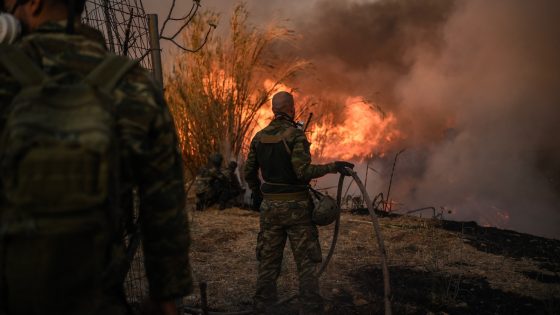LONDON — Hundreds of firefighters battled dozens of wildfires into submission in Greece over two days, a “superhuman effort” that had been paired with a “rapid operational response” to slow fast-moving blazes that threatened Athens, officials said.
“Forty hours after the extremely dangerous wildfire broke out in Varnavas, we can now say that there is no active front, only scattered hotspots,” Vassilis Kikilias, the Greek climate minister, said in a statement on Tuesday.
There were 41 wildfires over the past 24 hours, the Greek Fire Service said in an update Tuesday evening local time. Among those, 36 were “dealt with directly, in their initial stage, while the fire brigades are dealing with five more,” the Greek Fire Service said.
Volunteers attempt to extinguish a wildfire in Vrilissia, on the outskirts of Athens on August 12, 2024.
Aris Oikonomou/AFP via Getty Images
The fire danger is expected to continue into Wednesday, with a “very high risk of fire” predicted in several areas in the regions of Central Macedonia, Eastern Macedonia and the North Aegean, according to the Greek Fire Service, which said there will be aerial surveillance patrols due to the risk.
The wildfires, which arrived amid extreme heat, had been cropping up throughout the country since at least Saturday, European officials said.
Greek officials, who said an “outbreak” began Sunday, asked the European Commission for help battling the fires on Monday, according to a notice published by the Commission’s Emergency Response Coordination Centre.
Greek authorities said Tuesday that two minors were arrested for allegedly setting an intentional fire in a forest area in the country’s Attica region, where some wildfires have been raging.
ABC News visited on Tuesday the scene of a shop that was engulfed in flames in the north Athens suburb of Vrilissia, where local authorities said the burned body of a woman was found late Monday. The circumstances of the death were still unclear, but authorities said it appeared the woman had stayed behind or may have been trapped as others evacuated the building, which was located some 18 miles from where a wildfire erupted in the wider Attica region.
Hundreds of firefighters had been working to stop the fast-moving wildfires Monday near Athens, with tens of thousands of people under evacuation orders in the region, emergency officials said. Those fires burned some 6,600 hectares, or about 25 square miles, in the East Attica region, European officials said.
Government officials warned of heightened risk for fire in several areas, including the Athens peninsula and the region north of it. The fire risk category in those areas had been raised to “extreme,” weather officials said in a statement released Sunday.
Those fires burned in a “rugged” location, where firefighters had to navigate mountains, forests and villages, Kikilias said Tuesday.
“This is the reality: despite the rapid operational response — the new doctrine combined with technological support from drones, which has been applied to hundreds of wildfires throughout the summer — when extreme conditions prevail, the problem becomes insurmountable,” he said.

This combination of Planet Labs handout satellite pictures created on August 12, 2024 shows East Attica, Greece, on August 11, 2024, and during a wildfire on August 12, 2024.
Planet Labs PBC/AFP via Getty Images
But calmer winds had helped firefighters near Athens get the upper hand on several fires burning in the suburbs. Those winds were expected to pick on Tuesday evening.
In the next 48 hours, “the fire danger forecast is expected from high to very extreme across most of central Greece,” the Emergency Response Coordination Centre said.
European countries were sending assistance, including firefighters and vehicles. Italy was sending two planes, and France was sending a helicopter, Ursula von der Leyen, president of the European Commission, said on Monday. Teams of firefighters were on their way from Czechia and Romania, she said.
Temperatures near Athens were expected to climb on Tuesday to about 100 degrees Fahrenheit, with daily highs expected to be over 95 degrees for the remainder of the week, according to the Hellenic National Meteorological Center.

Volunteers fight a wildfire near Penteli, on August 12, 2024. Greece’s civil protection authorities ordered the evacuation of several towns in the north-eastern suburbs of Athens, threatened by a violent fire that started the day before and is spreading.
Angelos Tzortzinis/AFP via Getty Images
Dozens of blazes were burning Monday along the edges of a fire that broke out in Varnavas on Sunday afternoon, Col. Vassilios Vathrakogiannis, of the country’s fire service, said in a statement on Monday.
More than 700 firefighters and nearly 200 vehicles were working with the Civil Protection agencies, he said. Eighteen helicopters and 17 other firefighting aircraft had been in use since the Varnavas blaze began spreading.
Kikilias, the climate minister, said the people in towns north of Athens knew that “the firefighters, the Police, the Local Government, the volunteers, and the Army were there, fighting with superhuman efforts to prevent worse consequences.”
“These same firefighters have been working throughout the summer, extinguishing one fire after another,” he said.
ABC News’ Emma Ogao, Ellie Kaufman, Guy Davies and Britt Clennett contributed to this report.
Source Agencies




